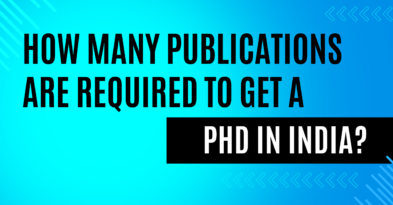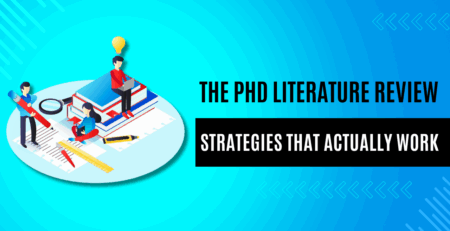Formulating a Conceptual and Theoretical Framework for a Winning PhD Thesis
Kenfra Research - Bavithra2025-07-21T12:49:08+05:30In academic research, formulating a conceptual and theoretical framework is more than just a formality—it’s the foundation of your study’s structure and clarity. Whether you’re pursuing a PhD, writing a thesis, or working on a dissertation, developing the right frameworks ensures your research is coherent, justified, and scientifically grounded.
This guide walks you through the meaning, purpose, and process of creating both conceptual and theoretical frameworks, helping you present a well-structured study that aligns with your objectives.
What is Conceptual Framework?
A conceptual framework is a visual or narrative tool that defines the key variables and illustrates how they are expected to interact in your research. It represents the researcher’s synthesis of literature and personal insights into the research topic.
Key Components of a Conceptual Framework
- Variables: Independent, dependent, mediating, and moderating
- Relationships: Hypothesized connections between concepts
- Scope: Context, boundaries, and limitations of the study
- Diagram: Visual representation of the framework
Why It Matters
Creating a conceptual framework helps researchers:
- Focus the study on relevant variables
- Align research questions with objectives
- Guide data collection and analysis
Avoid scope creep and irrelevant data
What is Theoretical Framework?
A theoretical framework involves choosing relevant theories or models that explain the relationships between variables. Unlike the conceptual framework, which is based on your interpretation, the theoretical framework draws from established academic theories.
Role of the Theoretical Framework
- Provides a scholarly lens to examine the research problem
- Justifies the research design and methodology
- Explains the relationships between variables
- Connects current research with existing knowledge
Common sources include educational theories (e.g., Bloom’s Taxonomy), psychological models (e.g., Cognitive Dissonance Theory), or business frameworks (e.g., Porter’s Five Forces).

Conceptual vs. Theoretical Framework: What’s the Difference?
A conceptual framework and a theoretical framework serve different but complementary roles in research. The conceptual framework is researcher-developed, offering high flexibility and is mainly used to define variables and outline their relationships in the context of the study. It acts as a practical guide for research design, data collection, and analysis. On the other hand, the theoretical framework is based on existing theories, making it less flexible but more academically grounded. It is used to explain relationships between variables through the lens of established scholarly theories, thereby providing a strong theoretical foundation for the research.
It’s essential to distinguish between these two frameworks to avoid confusion in your research paper or thesis.
Steps in Formulating a Conceptual and
Theoretical Framework
1. Define Your Research Problem
Start with a clear and focused research question or problem statement. This sets the stage for identifying variables and relevant theories.
2. Conduct a Thorough Literature Review
Study previous research in your field to understand:
- Key theories
- Common variables
- Established models
- Gaps or contradictions in knowledge
This process will guide your selection of concepts and theories.
3. Identify Key Variables and Concepts
List all the variables you intend to study. Define them based on your literature review and explain their relevance to your research questions.
4. Select Theories for the Theoretical Framework
Choose well-established theories that:
- Align with your research problem
- Offer insights into expected relationships
- Have been used in similar studies
Avoid forcing a theory into your study. Choose one that naturally fits your research scope.
5. Create the Conceptual Framework Diagram
Design a visual representation that shows how the identified variables are expected to relate. Use arrows, boxes, and labels for clarity.
6. Provide Rationale and Alignment
Explain the logic behind your framework choices. Ensure your framework aligns with your research objectives, questions, and hypotheses.
Examples to Clarify the Process
Example 1: Social Science Research
- Theoretical Framework: Social Learning Theory
- Conceptual Framework: Relationship between peer influence, media exposure, and adolescent behaviour
Example 2: Business Research
- Theoretical Framework: Innovation Diffusion Theory
- Conceptual Framework: Link between digital adoption, employee training, and customer satisfaction
Benefits of Formulating a Conceptual and Theoretical Framework
- Adds structure to your thesis or dissertation
- Clarifies your research scope
- Strengthens the argument and justification
- Improves credibility and scholarly value
- Facilitates a smooth research design and methodology process
Formulating a conceptual and theoretical framework helps you avoid ambiguity and enhances the overall quality of your research. It also allows readers and evaluators to understand the logical flow of your ideas and findings.
Common Pitfalls to Avoid
- Choosing irrelevant theories
- Ignoring variable definitions
- Using too many overlapping constructs
- Failing to link the framework with research design
- Skipping visual representation in conceptual design
Key Messages to Remember
In conclusion, formulating a conceptual and theoretical framework is a foundational step in the research process. It not only improves clarity and focus but also enhances the scholarly integrity of your study. By identifying the right theories, defining meaningful variables, and establishing logical relationships, you ensure that your research stands on solid ground.
Whether you’re writing a dissertation, journal paper, or PhD proposal, a well-constructed framework can make the difference between a good study and a great one. Kenfra Research is here to guide you through every step of building a strong research framework that supports academic excellence.






Leave a Reply